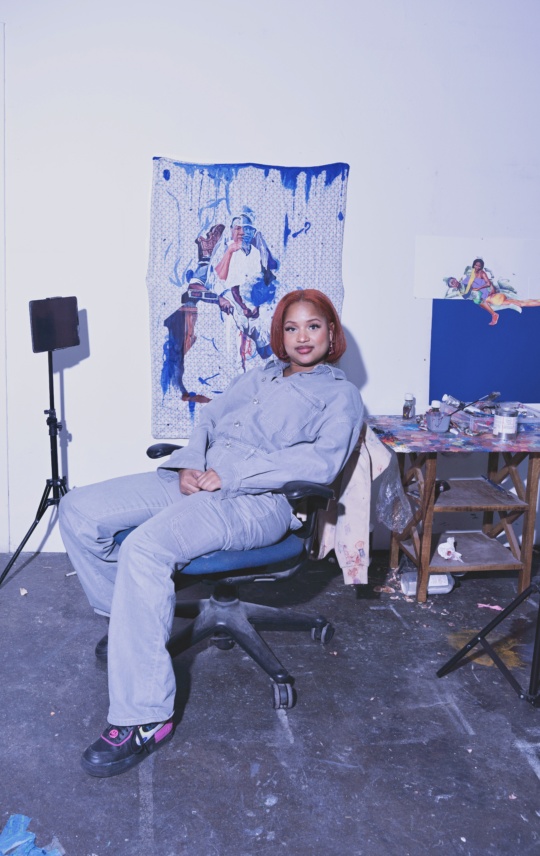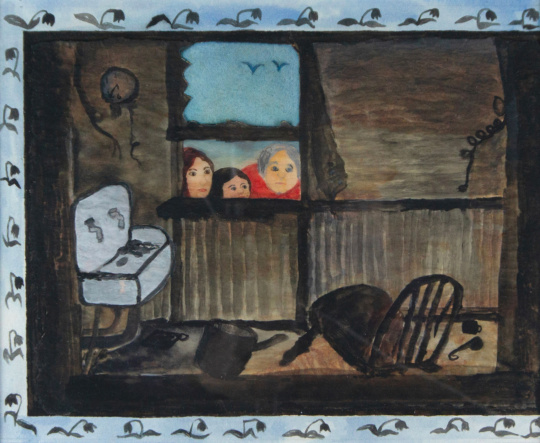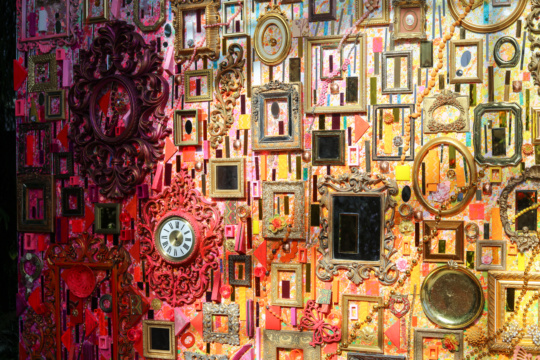
For your summer reading pleasure, BURNAWAY brings you Just Like Suicide, a novel by artist Mery Lynn McCorkle, set in the Los Angeles art world. She writes from experience, having lived for years in Williamsburg, Brooklyn, when it still was the art frontier, and then LA; she now resides in Rome, Georgia. She describes the book as “a compendium of interlocking tales cataloguing self demolition and success in the Los Angeles art scene, from the point of view of artists, dealers and family members.”
We’ll post sequential chapters from McCorkle’s book every Wednesday and Friday over the summer. Or click here to buy the book now.
Eleven
Anyone wobbling through a door reminded Maggie of her great aunt, the one with dozens and dozens of cats. Miss Tillie was a serious drinker, apparently born with a remarkably resilient liver since she stayed pretty much tipsy for fifty something years and died from injuries incurred from falling off a tall ladder in the barn at the age of seventy-three. According to all the gossip, Miss Tillie started imbibing the day after she inherited the old house, the two acres of property around it and part interest in a tiny oil well in Texas from her mother who never approved of her and chastised her daily for being too smart for her own good. “Thank goodness I never paid my mother any mind,” she told Maggie, “otherwise I would never have followed the stock market.” Through a series of prescient stock buys, most notably seeing the value in computers before most people even knew what they were, she grew her meager inheritance into a nice sized fortune.
Miss Tillie’s younger brother – their mother’s pride and joy and Maggie’s grandfather – inherited all the arable land, the big Victorian house, their father’s substantial stock portfolio, the livestock and the lake. All of which he frittered away on get-rich scams. He was always angry with Miss Tillie because she would never loan him money for the next sure fire investment yet he would scoff at her sound financial tips. In his mind, she and she alone was responsible for his lack of success in the world. Everything she had by rights should be his.
What was she fixing to do with all her money anyway? She was worthless in his eyes, a woman with no husband and no children. Miss Tillie never married. As she explained it to Maggie, “By the time I turned fourteen, I was the tallest person in the whole county. When I finally stopped growing, no man around these parts got within four inches of my height and how could I go through life married to a man I looked down on?”
Maggie first started visiting regularly at age four every time her father was deployed. Her momma told everyone she needed time in prayer so she checked herself into a convent whenever she could for a week at a time and Maggie stayed with Miss Tillie while the increasing number of boys stayed with their grandparents. This arrangement lasted until Maggie was almost twelve. At that point, Grandpa Billy died and both Miss Tillie and Grandma Beulah refused to care for so many boys. “Those scamps will break all my china,” Miss Tillie told Momma. “Your chirren need a horsewhip and a strong man to keep ’em mindin’,” Grandma Beulah said. And Momma didn’t disagree with either of them. So Maggie couldn’t visit her Great Aunt Tillie any more since her momma really couldn’t handle the boys without her. But Miss Tillie didn’t live that much beyond her brother anyway.
From Maggie’s first memories of her, Miss Tillie wore elegant silk dresses and long gloves from dawn until dusk, a small crystal cordial glass in her hand from lunchtime on, always full. Only the color of the fluid changed with the seasons. She always wore a broad hat outside, flowers and leaves fastened around the brim. The flowers always matched the colors on her silk dress. In winter, she wrapped her silk clad self in mink, making her somewhat dangerous. Maggie was knocked backwards a good foot once with the static electricity. “I am the lightning bolt of Zeus,” Miss Tillie giggled. Regardless of how much she tippled, Aunt Tillie stood straight and even dead drunk swayed only with grace.
Maggie’s main duty on these visits was to haul the empty bottles accumulated in the pantry to out behind the barn. “Too bad Prohibition was repealed, Magpie.” she told Maggie with a wink, “I could sell them to the moonshiners for a mint.”
From the very first Maggie separated the bottles by size and shape, piling them neatly like logs. She lined up the prettiest ones, pushing their necks into the dirt so spiders wouldn’t set up webs inside and drown in the next rain. By the time she was nine, she had enough bottles to build a glass fort, although on each visit she had to pretty much start over. The cats were experts at tumbling down the walls.
Until shortly after Maggie turned nine, Miss Tillie attended every event in a three county area, every dance, every recital, every play, every high school football game, always in an elegant silk dress with those long gloves and a flower laden hat, sometimes with a parasol. She was a sight but being rich has its privileges. Something happened one night, though, and she never drove again. She’d never talk about it. And she hated being chauffeured. Only for dire emergencies would she permit anyone drive her around. “Only plutocrats have chauffeurs.”
From that night on, Miss Tillie stopped wearing the silk dresses except when people came to call on the weekends and on some Tuesday evenings. She wore a plain cotton dress otherwise which Maggie presumed was a form of penance. But the crystal cordial glass remained. The gloves remained.
Miss Tillie was the county patron of the arts so her weekends were busy with requests. People would come up to her front porch carrying flowers or a dish of food, wading through the cats to ask her for help funding theatrical productions, school recitals, music lessons and instruments for the gifted. She helped put more than one smart kid through college and hired a bus every year to haul the eighth graders to see the High Museum in Atlanta. One year she even bought the entire high school football team new helmets and uniforms. “It’s always important to dress well,” she told the boys as they lined up on her veranda to thank her and eat her cookies, mindful not to kick the cats. “As Mark Twain once said, ‘Clothes make the man. Naked people have little or no influence on society.’” When their coach gasped, she winked at him. “Young man, let me reassure you that none of these boys will ever forget the importance of dressing well from here on out.”




